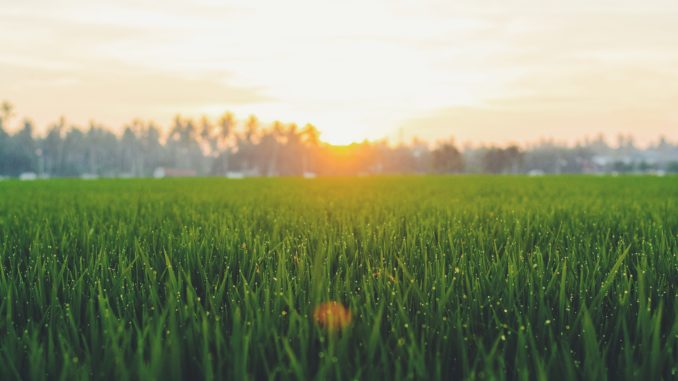
By Jana Gray
The only way to accomplish a thick, healthy lawn in Colorado is to put in the work. A healthy lawn requires timely applications of water and fertilizer, as well as regular mowing and other maintenance. Another key to ensuring a lush, green lawn is choosing the right grass seed.
Here’s a quick guide to help you choose the perfect grass seed for your lawn in northern Colorado.
Grass Seed Selection Considerations
There are two categories of grass: warm-season grass and cool-season grass. Within those categories, there are hundreds of different species to choose from.
The best way to select an ideal grass seed is to select a variety that’s well suited for your climate and hardiness zone. Planting zones are determined based on a number of factors including humidity, length of the growing season, summer highs, winter lows, rainfall, and wind.
The characteristics of your particular landscape will also play a role in determining the ideal grass seed. If your lawn receives a lot of foot traffic or you have pets, you may want to consider a grass species that can accommodate that. If your lawn receives heavy sun, full shade, or partial shade, then these are all considerations that you should make when choosing the right grass seed for your space.
Most Popular Choice: Kentucky Bluegrass
This meadow-grass originally came to the United States by way of the Spanish Empire during the 15th and 19th centuries, mixed in with other types of grasses. Today, Kentucky Bluegrass is popular, and therefore quite common all throughout the colder parts of the United States.
Because it can stand up to heavy foot traffic, this species of grass is common for use in lawns and gardens as well as in athletic fields. The blades are thin but grow densely with regular watering. This grass spreads quickly, heals quickly, and can maintain its density well with proper care which makes it an ideal choice for Colorado lawns.
Best For Shaded Areas: Fine Fescue
If you’re dealing with full or partial shade, then fine fescue is a solid choice. This disease-resistant grass is quick to grow and can last throughout the year. It grows in bunches, which means that planting with seed requires care. You will need to make sure not to plant too much in a single spot.
In some regions, fine fescue is considered to be an invasive species. In others, however, it is highly prized for its ability to aid in erosion control and ground cover, to serve as pasture for wild animals, and as an ideal choice for lawns.
Quickest to Germinate: Perennial Ryegrass
If you’re looking for a quick-growing and versatile grass seed, perennial ryegrass is a solid option. Regarded as one of the quickest grass seeds to germinate, this is a great targeting grass seed for many purposes.
Because it establishes quickly and has a long growing season, perennial ryegrass is recommended as pasture, turf, and lawn cover that can provide year-round coverage in cold-weather regions. It also tolerates traffic very well and when damaged tends to recover quite quickly.
Best Heat Tolerance: Sheep Fescue
Sheep fescue is a densely tufted cool-season grass that can be found throughout the United States. It offers excellent tolerance to cold, heat, and drought, and can also be moderately shade tolerant. It does well on its own or as part of a mix with other similar grass seeds.
According to the USDA, you should not mix sheep fescue with aggressive grasses that have been introduced to the region. However, this species is particularly compatible with native grasses that are slower growing. Examples of compatible grasses include thick spike wheatgrass, bluebunch wheatgrass, streambank wheatgrass, big bluegrass, and needlegrass.
Sheep fescue is a popular option for erosion control and ground cover. This is especially due to the fact that it requires minimal maintenance and is capable of withstanding heavy traffic without taking too much damage.
Specialty Blends
Mixing grass seeds is an option when you have specific needs that are not being met by one species of grass. However, as noted above, not every grass species will be compatible with every other species. There are commercially available grass seed blends that take the guesswork out of meeting specific needs.
A “Sun and Shade Blend,” for example, is a highly adaptable seed mix that will allow for complete ground cover regardless of how much sun or shade a particular area of the lawn receives. If your concern involves animals in the yard, a popular choice is Triple-Play Tall Fescue, which is a blend of three traffic-resistant seeds with deep roots and a medium texture.
Choose the Best Grass for Your Colorado Lawn
Knowing which type of grass seed will best suit your lawn is step one in revitalizing your landscape. Whether you are redoing your lawn from scratch or simply trying to improve patchy spots, the right seed can make all the difference.
Support Northern Colorado Journalism
Show your support for North Forty News by helping us produce more content. It's a kind and simple gesture that will help us continue to bring more content to you.
BONUS - Donors get a link in their receipt to sign up for our once-per-week instant text messaging alert. Get your e-copy of North Forty News the moment it is released!
Click to Donate